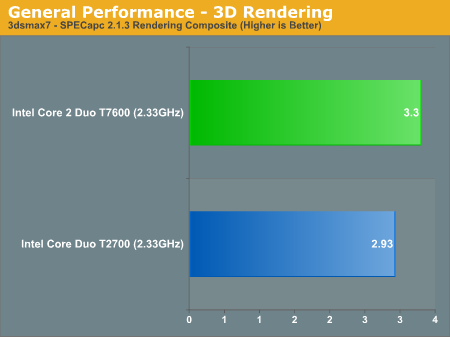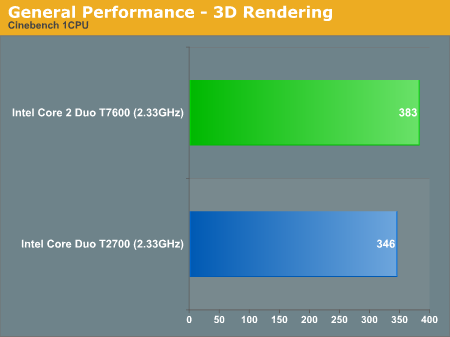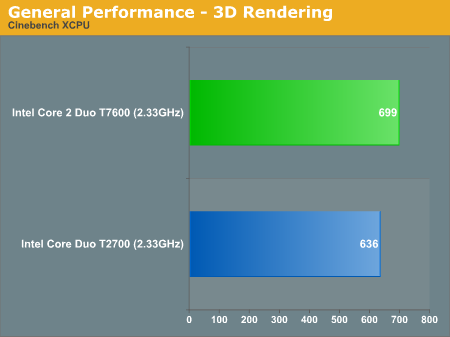Mobile CPU Wars: Core 2 Duo vs. Core Duo
by Anand Lal Shimpi on August 3, 2006 9:25 AM EST- Posted in
- CPUs
3D Rendering Performance using 3dsmax 7 & CineBench 9.5
We're looking at 3D rendering performance using two different applications: 3D Studio Max and Cinebench 9.5. Cinebench is a free performance testing utility based off of the CINEMA 4D R8 rendering package. Our scores from 3D Studio Max are a composite score from four rendering tests: CBalls2, SinglePipe2, UnderWater, and 3dsmax5 Rays.

Looking at 3dsmax, the Core 2 Duo performance advantage jumps back up to 12.6% thanks to its wider core and improvements to SSE throughput. If you do heavy 3D work on your notebook, the Core 2 advantage may help you reduce those render times.


Performance under Cinebench mimics what we saw under 3dsmax, with performance going up by around 10% compared to Core Duo.
Application Performance using Winstone 2004
Encoding Performance using DivX 6.1, WME9, Quicktime (H.264) & iTunes










46 Comments
View All Comments
IntelUser2000 - Saturday, August 5, 2006 - link
Correct. Lots of the benchmarks show 10% advantage for Core 2 Duo over Core Duo. The only 10% advantage 4MB L2 over 2MB L2 is in a single app.
bob661 - Thursday, August 3, 2006 - link
Video makes ALL the difference in the world.monsoon - Thursday, August 3, 2006 - link
I'm in the market for a mini PC to do video trancode, and I was considering the MEROM chip to compare to YONAH......in the end, given the right graphic card ( add ATI X1400 series or higher here ) with hardware embedded transcode features, i guess the YONAH fits my bill just right.
And i get to pay 100$ or 200$ less than the same computer with a MEROM which could not offer me better on the video side...
What do you think ?
bob661 - Thursday, August 3, 2006 - link
I would get the best video you can get with the cash saved from getting the Memron.Tiamat - Thursday, August 3, 2006 - link
Whats the difference between the Intel Core Duo T2300E* and the Intel Core Duo T2300E?I see a difference in price, but not specs. The page in the article does not address the asterisk...
Anand Lal Shimpi - Thursday, August 3, 2006 - link
The asterisk means that the CPU lacks support for Intel Virtualization Technology (VT). I had the note on Page 3 but I forgot to include it on Page 2 :) Thanks for the heads up :)Take care,
Anand